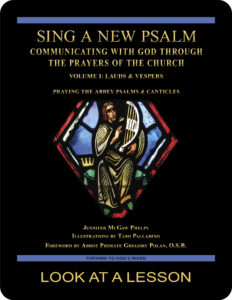 Sing a New Psalm:
Sing a New Psalm:
Communicating with God
Through the Prayers of the Church
Volume I: Lauds & Vespers
Lesson 1 Set a Guard on My Mouth
Psalm 141, Psalm 142, and Psalm 119:105–112
Sunday 1st Vespers (Week I)
Revised Standard Version Catholic Edition (RSVCE)*
New American Bible Revised Edition (NABRE)*
Catechism of the Catholic Church
ex libris (in our library)
Aperuit Illis (Instituting the Sunday of the Word of God)
Tami Palladino’s visual-meditation journal
next lesson: O God, at Dawn I Seek You
This material coordinates with Lesson 1 on pages 6–9 in Sing a New Psalm: Communicating with God Through the Prayers of the Church—Volume I: Lauds & Vespers. Our Catholic Bible study is based on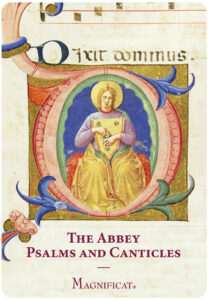 The Abbey Psalms and Canticles, an English translation of the Psalms prepared by the monks at Conception Abbey in 2010 and first published as The Revised Grail Psalms. The Abbey Psalms and Canticles is a revision of that work, finished in 2020 and published by the United States Conference of Catholic Bishops (USCCB). Wording and numbering of some Psalms and verses in other translations may differ. This new translation of the Psalms in the process of being added to all English-language Liturgy of the Hours books used in the United States. The USCCB also plans a liturgical Bible based on the NABRE translation.
The Abbey Psalms and Canticles, an English translation of the Psalms prepared by the monks at Conception Abbey in 2010 and first published as The Revised Grail Psalms. The Abbey Psalms and Canticles is a revision of that work, finished in 2020 and published by the United States Conference of Catholic Bishops (USCCB). Wording and numbering of some Psalms and verses in other translations may differ. This new translation of the Psalms in the process of being added to all English-language Liturgy of the Hours books used in the United States. The USCCB also plans a liturgical Bible based on the NABRE translation.
“Unlike other prayers in sacred Scripture, the prayers contained in the Psalms are not inserted into a narrative story that specifies their meaning and function. Instead, the Psalms are given to the believer precisely as a text of prayer. Since they are the Word of God, the believer who prays the Psalms speaks to God using the very words that God himself has given to us. Thus, in praying the Psalms we learn to pray. The Psalms are a school of prayer.”—Pope Benedict XVI
welcome to our in-depth study of the Psalms
We invite groups and individuals to check out the sample first lesson from this 28- lesson Turning to
lesson Turning to  God’s Word Catholic Bible study. Our online study pages include additional questions, commentary, and prayers based on the Psalm texts. Sing a New Psalm: Communicating with God Through the Prayers of the Church—Volume I: Lauds & Vespers has been granted an imprimatur. A digital version of this study can be purchased from our website shop. Volume II: Vigils, Day Prayer & Compline is scheduled for publication in 2025. If you have a Bible-study question or comment, click on one of the “ask us your question” or “what do you think” buttons on any online study page.
God’s Word Catholic Bible study. Our online study pages include additional questions, commentary, and prayers based on the Psalm texts. Sing a New Psalm: Communicating with God Through the Prayers of the Church—Volume I: Lauds & Vespers has been granted an imprimatur. A digital version of this study can be purchased from our website shop. Volume II: Vigils, Day Prayer & Compline is scheduled for publication in 2025. If you have a Bible-study question or comment, click on one of the “ask us your question” or “what do you think” buttons on any online study page.
every Turning to God’s Word Bible study carries an imprimatur
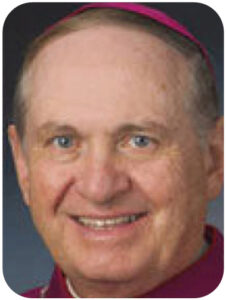 Sing a New Psalm: Communicating with God Through the Prayers of the Church—Volume I: Lauds & Vespers
Sing a New Psalm: Communicating with God Through the Prayers of the Church—Volume I: Lauds & Vespers  was granted an imprimatur by the Most Reverend Richard E. Pates, (left), bishop emeritus of the Diocese of Des Moines, on July 1, 2015; the censor librorum for the Diocese of Des Moines, the Very Reverend Aquinas Nichols, granted the nihil obstat. These are official declarations that a book or pamphlet is free of
was granted an imprimatur by the Most Reverend Richard E. Pates, (left), bishop emeritus of the Diocese of Des Moines, on July 1, 2015; the censor librorum for the Diocese of Des Moines, the Very Reverend Aquinas Nichols, granted the nihil obstat. These are official declarations that a book or pamphlet is free of  doctrinal or moral error. There’s no implication that those who’ve granted the imprimatur and nihil obstat agree with the contents, opinions, or statements expressed in the work. All Turning to God’s Word Catholic Bible studies are submitted to the Church before publication. Visit the archives of Lost in Translation to read more about the Latin terms imprimatur & nihil obstat. Turning to God’s Word Catholic Bible studies written after 2020 are being submitted to the Most Reverend William M. Joensen, Ph.D. (right), bishop of the Diocese of Des Moines. This includes the Volume II: Vigils, Day Prayer & Compline of this study, which is scheduled for publication in 2025.
doctrinal or moral error. There’s no implication that those who’ve granted the imprimatur and nihil obstat agree with the contents, opinions, or statements expressed in the work. All Turning to God’s Word Catholic Bible studies are submitted to the Church before publication. Visit the archives of Lost in Translation to read more about the Latin terms imprimatur & nihil obstat. Turning to God’s Word Catholic Bible studies written after 2020 are being submitted to the Most Reverend William M. Joensen, Ph.D. (right), bishop of the Diocese of Des Moines. This includes the Volume II: Vigils, Day Prayer & Compline of this study, which is scheduled for publication in 2025.
the popes inspire us—serious Catholics study the Word of God
In his apostolic letter Aperuit Illis (Instituting the Sunday of the Word of God) issued motu proprio (of his  own accord), Pope Francis established the Third Sunday in Ordinary Time to be devoted to the celebration, study, and dissemination of the Word of God. The Holy Father’s apostolic letter was published on September 30, 2019, the feast of St. Jerome and the 1600th anniversary of the saint’s death. St. Jerome, who translated the Latin
own accord), Pope Francis established the Third Sunday in Ordinary Time to be devoted to the celebration, study, and dissemination of the Word of God. The Holy Father’s apostolic letter was published on September 30, 2019, the feast of St. Jerome and the 1600th anniversary of the saint’s death. St. Jerome, who translated the Latin 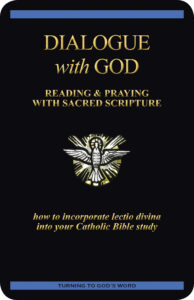 Vulgate Bible from Greek and Hebrew manuscripts, is famous for saying: “Ignorance of Scripture is ignorance of Christ,” and he’s the patron of translators and librarians. In Aperuit Illis, the Holy Father calls attention to the sacramental nature of the Word of God, pointing to the unbreakable bond between Sacred Scripture and the Eucharist. In 2025, the Church will celebrate the Word of God on Sunday, January 26. We’ve posted a free digital version of Dialogue with God: Reading & Praying with Sacred Scripture, our guide to incorporating the Church’s traditional practice of lectio divina (sacred reading) into regular Bible study.
Vulgate Bible from Greek and Hebrew manuscripts, is famous for saying: “Ignorance of Scripture is ignorance of Christ,” and he’s the patron of translators and librarians. In Aperuit Illis, the Holy Father calls attention to the sacramental nature of the Word of God, pointing to the unbreakable bond between Sacred Scripture and the Eucharist. In 2025, the Church will celebrate the Word of God on Sunday, January 26. We’ve posted a free digital version of Dialogue with God: Reading & Praying with Sacred Scripture, our guide to incorporating the Church’s traditional practice of lectio divina (sacred reading) into regular Bible study.
read more Church documents
Find links to magisterial documents referred to in Turning to God’s Word Catholic Bible  studies, including Aperuit Illis (Instituting the Sunday of the Word of God), at ex libris—magisterial documents. The page lists significant recent encyclicals as well as a number of historical Church documents.
studies, including Aperuit Illis (Instituting the Sunday of the Word of God), at ex libris—magisterial documents. The page lists significant recent encyclicals as well as a number of historical Church documents.
a few reminders about Turning to God’s Word Bible studies
The most distinguishing feature of our Bible studies is that they’re Catholic. Each one has been granted an imprimatur, which means that a bishop has read the work and found nothing contrary to Church teaching on morals or faith. Note that the imprimatur makes no claim that a work is equivalent to Church teaching, simply that it isn’t opposed to what the Church teaches. Practically speaking, this means that you don’t have to accept Turning to God’s Word interpretations of Scripture, only that choosing to do so doesn’t amount to heresy. Choosing not to accept conclusions of a work that’s been granted an imprimatur doesn’t immediately plunge you into heretical territory, but choosing not to accept Church teaching related to those conclusions does.
read the Catechism—how to avoid heresy
The imprimatur reinforces and validates the claim that Turning to God’s Word Bible studies are Catholic. All participants have a right to expect that discussions about our Bible studies will focus on Catholic teaching. That doesn’t mean that someone won’t occasionally have a question about Church teaching. Not knowing what the Church teaches about a particular issue isn’t heretical. Asking a question about Church teaching isn’t heretical. Failing to understand Church teaching isn’t heretical. Insisting that Church teaching is wrong is.
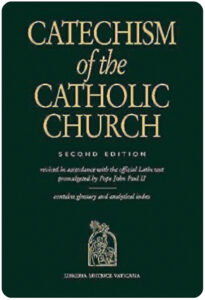 Most people who begin to study the Psalms are caught off guard by how many challenging theological ideas are found in Scripture. There are a surprising number of things many Catholics believe to be Church teaching that actually are not. In this study, we attempt to present Scripture and Church teaching related to the Psalms as unambiguously as possible. When in doubt, you can refer to the Catechism of the Catholic Church or talk with your parish priest about any doctrine that remains unclear.
Most people who begin to study the Psalms are caught off guard by how many challenging theological ideas are found in Scripture. There are a surprising number of things many Catholics believe to be Church teaching that actually are not. In this study, we attempt to present Scripture and Church teaching related to the Psalms as unambiguously as possible. When in doubt, you can refer to the Catechism of the Catholic Church or talk with your parish priest about any doctrine that remains unclear.
If a Church teaching seems particularly unsettling even after studying the Catechism and speaking with someone who’s knowledgeable regarding Catholic doctrine, you might want to examine whether there might be a personal or emotional reason why you’re having difficulty. Pray for God’s guidance and be open to receiving a different answer than you anticipated, possibly at a later time than you expected or hoped.
be respectful of the others in your group
Keep in mind that most people in your discussion group are there for a Catholic interpretation of Scripture. People from other faith backgrounds are welcome, but the focus of any Turning to God’s Word study always is going to be Catholic in nature. The following opening prayer emphasizes maintaining mutual respect amid differences of opinion:
Heavenly Father, send forth your Spirit to enlighten our minds
and dispose our hearts to accept your truth.
Help us to listen to one another with openness and honesty,
eager to learn from the talents and intuitions that you have given each of us.
Never let differences of opinion diminish our mutual esteem and love.
May we leave this meeting with more knowledge and love for you and your Son.
In the unity of the Holy Spirit. Amen.
You can find other opening prayers on our website. We especially like the following:
Lord Jesus, you promised to send your Holy Spirit to teach us all things.
As we read and study your word today,
allow it to touch our hearts and change our lives. Amen.
watch an introductory video
Learn more about the goal of this Turning to God’s Word Catholic Bible study of the Psalms and how regularly praying these ancient songs at Lauds and Vespers—or any time—can transform your days and deepen your relationship with God. We’ll look at the sample lesson—”Set A Guard on My Mouth”—to get an idea of the elements included in the other lessons. Common problems often experienced when praying the Psalms are addressed, and I share some of my favorite passages from the Psalms.
the popes inspire us—the Psalms aren’t just about the past
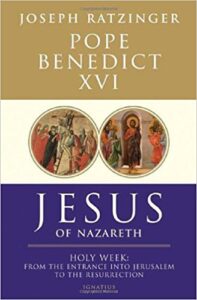 In the second volume of his excellent three-part series Jesus of Nazareth: Holy
In the second volume of his excellent three-part series Jesus of Nazareth: Holy  Week, Pope Benedict XVI examines Jesus’ last anguished words of prayer from the cross, recognized as Psalm 22:2: “My God, my God, why have you forsaken me?” (The Abbey Psalms and Canticles). The Holy Father explains that the Psalms must be understood in the same context in which they originally were prayed. He writes: “To be sure, the Psalms are deeply personal prayers, formed while wrestling with God, yet at the same time they are uttered in union with all who suffer unjustly, with the whole of Israel, indeed with the whole of struggling humanity, and so these Psalms
Week, Pope Benedict XVI examines Jesus’ last anguished words of prayer from the cross, recognized as Psalm 22:2: “My God, my God, why have you forsaken me?” (The Abbey Psalms and Canticles). The Holy Father explains that the Psalms must be understood in the same context in which they originally were prayed. He writes: “To be sure, the Psalms are deeply personal prayers, formed while wrestling with God, yet at the same time they are uttered in union with all who suffer unjustly, with the whole of Israel, indeed with the whole of struggling humanity, and so these Psalms  always span past, present, and future.” For more information about this and for excerpts from other books helpful in Catholic Bible study, visit ex libris—main bookshelf.
always span past, present, and future.” For more information about this and for excerpts from other books helpful in Catholic Bible study, visit ex libris—main bookshelf.
WHAT DO YOU THINK about interpreting Scripture?
 The Church encourages Catholics to read and interpret Scripture on our own as long as we follow these two rules:
The Church encourages Catholics to read and interpret Scripture on our own as long as we follow these two rules:
1) Our interpretation can’t contradict anything else in Scripture.
2) Our interpretation can’t contradict Church teaching.
In order to comply, we need to know everything else that’s in the Bible as well as everything that the Church teaches. That’s a tall order, which is why each Turning to God’s Word Catholic Bible study is submitted to the Church for an imprimatur. The imprimatur for Sing a New Psalm: Communicating with God Through the Prayers of the Church—Volume I: Lauds & Vespers is a guarantee that the Church finds nothing objectionable in the work. You’re free to agree with interpretations in this Bible study, but it’s not essential that you do so. There are many different interpretations in other commentaries, but very few of them carry an imprimatur. This doesn’t mean that they necessarily pose any problems in regard to Catholic doctrine or moral teaching, but there’s no Church guarantee that they don’t.
When considering opinions that haven’t been granted an imprimatur, don’t be afraid to ask questions. Our Bible studies address some common interpretations, but there are innumerable opinions floating around about the meaning of different passages in the Bible—including in the Psalms.
 ? Here’s the first question to ask about an opinion expressed in any commentary: How closely does it adhere to what we can read in the biblical text?
? Here’s the first question to ask about an opinion expressed in any commentary: How closely does it adhere to what we can read in the biblical text?
? Do viewpoints about the meaning of the Bible passages contradict anything else you already know from Scripture?
? Do they contradict anything from Church teaching? The Catechism of the Catholic Church addresses a large number of questions related to common Scripture interpretations.
a caution to think before we speak
The title of this lesson—”Set a Guard on My Mouth”—may give many people pause. The illustration was created by Turning to God’s Word co-founder Tami Palladino, and it captures the idea that we need  God’s help to avoid saying things that we later will regret. There are a variety of ways that we can misspeak. The most serious, of course, appears in the Ten Commandments—taking God’s name in vain. Lesson 13 Our Help Is in the Name of Our LORD for Friday Vespers (Week I) on page 54 in Sing a New Psalm: Communicating with God Through the Prayers of the Church—Volume I: Lauds & Vespers, covers the Divine Praises, which were written in reparation for blasphemy and profane language. We all can think of many other ways in which we engage in harmful speech. It’s fitting that the prayers for Sunday First Vespers focus our attention at the beginning of the week on the words that we allow to escape our lips. As each new week unfolds, it’s up to us to make wise choices regarding what we say about God and others—as well as what we say to God and others. In our prayer we can anticipate challenges we may face, and we can ask God to help us to maintain control over our words no matter what situations may arise in our lives. Click on Tami’s illustration (above right) to enlarge it. Her original illustration is on page 7 in Sing a New Psalm: Communicating with God Through the Prayers of the Church—Volume I: Lauds & Vespers.
God’s help to avoid saying things that we later will regret. There are a variety of ways that we can misspeak. The most serious, of course, appears in the Ten Commandments—taking God’s name in vain. Lesson 13 Our Help Is in the Name of Our LORD for Friday Vespers (Week I) on page 54 in Sing a New Psalm: Communicating with God Through the Prayers of the Church—Volume I: Lauds & Vespers, covers the Divine Praises, which were written in reparation for blasphemy and profane language. We all can think of many other ways in which we engage in harmful speech. It’s fitting that the prayers for Sunday First Vespers focus our attention at the beginning of the week on the words that we allow to escape our lips. As each new week unfolds, it’s up to us to make wise choices regarding what we say about God and others—as well as what we say to God and others. In our prayer we can anticipate challenges we may face, and we can ask God to help us to maintain control over our words no matter what situations may arise in our lives. Click on Tami’s illustration (above right) to enlarge it. Her original illustration is on page 7 in Sing a New Psalm: Communicating with God Through the Prayers of the Church—Volume I: Lauds & Vespers.
David’s experience in the cave
Psalm 142 is credited to David when he was in the cave. This refers to an instance in the First Book of Samuel 24:1–22 in which David, hidden in a cave, refuses an opportunity to take Saul’s life in secret—even though at that time Saul was searching for David with the intent of killing him.
 religious law—you could look it up in our archives
religious law—you could look it up in our archives
In Psalm 119, the Psalmist considers the decrees of the LORD to be his eternal heritage, and he’s determined to obey them. To learn about the link between religious law and reality, read Lost in Translation, an online column in which Turning to God’s Word author Matthew Phelps helps readers connect with ideas expressed in the original languages of the Scriptures. New Lost in Translation entries are posted on Mondays, and past entries are archived on our website. Contact us if you’d like to receive Lost in Translation by email every week.
encountering Jesus Christ through Scripture
The Psalms are very personal prayers, so any Bible study based on these prayers necessarily is going to get personal. The questions in Sing a New Psalm: Communicating with God Through the Prayers of the Church—Volume I: Lauds & Vespers attempt to address several concerns about each Psalm. First, what did the original Psalmist have in mind when he composed his prayer? Second, what might Jesus have had in mind when he prayed the same words? Third, how do present-day Christians interpret these ancient prayers? A final thing to consider is what these words mean to us as we’re praying.
WHAT DO YOU THINK should be the ultimate goal of Bible study?
The ultimate goal of this Bible study is to increase our individual understanding of what God is communicating to us through the Psalms and what we wish to communicate back to God. Because of this, many of the questions ask us to think about the meaning of the Psalms in the context of our own lives, but it’s still important to focus on the facts presented in the text.
 ? Who’s praying?
? Who’s praying?
? What’s prompting their prayer?
? What’s going on historically at the time the Psalm was written?
? What expectation does the Psalmist have regarding how God might respond?
? What can you learn about God from the particular Psalm that you’re studying?
? How are your prayers like the prayers of the Psalmist?
? Are there any ways that your prayers differ?
? What motivates you to pray?
? What’s going on in your life?
? What expectations do you have about how God might respond to your prayer?
the popes inspire us—dealing with the temptation to speak evil
 How do you handle temptations? “Evil Enticements” appears on page 6 in Sing a New Psalm: Communicating with God Through the Prayers of the Church—Volume I: Lauds & Vespers and addresses the attractive nature of sin. In this general audience, Pope St. John Paul II examines the Psalmist’s indignant condemnation of evil in Psalm 141. The Holy Father points out that the Psalmist’s hostility toward sin is paired with an absolute certainty that it’s God who will intervene in history to condemn injustice.
How do you handle temptations? “Evil Enticements” appears on page 6 in Sing a New Psalm: Communicating with God Through the Prayers of the Church—Volume I: Lauds & Vespers and addresses the attractive nature of sin. In this general audience, Pope St. John Paul II examines the Psalmist’s indignant condemnation of evil in Psalm 141. The Holy Father points out that the Psalmist’s hostility toward sin is paired with an absolute certainty that it’s God who will intervene in history to condemn injustice.
read the Catechism—do you know the precepts of the Church?
The Psalms prayed for Sunday 1st Vespers (Week I) include a portion of Psalm 119, the longest Psalm in the Bible. In this elaborate prayer, the Psalmist praises God’s law and promises to uphold it. At the time Psalm 119 was written, the Torah was understood to contain all of the precepts of the law. The Torah also was viewed as a source of God’s blessing. In the present day, many people have difficulty accepting any type of authority or law as a source of blessing—even the God-given Ten Commandments. Sadly, a number of Catholics are unable even to name the precepts of the Church. If  you fall into this camp, you can find these precepts listed in paragraphs 2042–2043 in the Catechism of the Catholic Church. The remaining verses of Psalm 119 form the basis for a week’s worth of midday prayers that will be covered in Sing a New Psalm: Communicating with God Through the Prayers of the Church—Volume II: Vigils, Day Prayer & Compline, scheduled for publication in 2025.
you fall into this camp, you can find these precepts listed in paragraphs 2042–2043 in the Catechism of the Catholic Church. The remaining verses of Psalm 119 form the basis for a week’s worth of midday prayers that will be covered in Sing a New Psalm: Communicating with God Through the Prayers of the Church—Volume II: Vigils, Day Prayer & Compline, scheduled for publication in 2025.
2042 The first precept (“You shall attend Mass on Sundays and on holy days of obligation and rest from servile labor”) requires the faithful to sanctify the day commemorating the Resurrection of the Lord as well as the principal liturgical feasts honoring the mysteries of the Lord, the Blessed Virgin Mary, and the saints; in the first place, by participating in the Eucharistic celebration, in which the Christian community is gathered, and by resting from those works and activities which could impede such a sanctification of these days.
The second precept (“You shall confess your sins at least once a year”) ensures preparation for the Eucharist by the reception of the sacrament of Reconciliation, which continues Baptism’s work of conversion and forgiveness.
The third precept (“You shall receive the sacrament of the Eucharist at least during the Easter season”) guarantees as a minimum the reception of the Lord’s Body and Blood in connection with the Paschal feasts, the origin and center of the Christian liturgy.
2043 The fourth precept (“You shall observe the days of fasting and abstinence established by the Church”) ensures the times of ascesis and penance which prepare us for the liturgical feasts and help us acquire mastery over our instincts and freedom of heart.
The fifth precept (“You shall help to provide for the needs of the Church”) means that the faithful are obliged to assist with the material needs of the Church, each according to his own ability.
The faithful also have the duty of providing for the material needs of the Church, each according to his abilities.
write your own Psalm
An underlying theme in the Psalms is the idea of singing a new song to God. It’s this idea that suggested the title for our Turning to God’s Word Catholic Bible study. If you’d like to offer God a new type of prayer, you might want to consider trying your hand at writing a Psalm of your own. You can find some suggestions on the back page in Sing a New Psalm: Communicating with God Through the Prayers of the Church—Volume I: Lauds & Vespers. Keep in mind that your prayer only will be new if you tell God something that he doesn’t usually hear from you.
ex libris—the Abbot Primate shares his thoughts on the Psalms

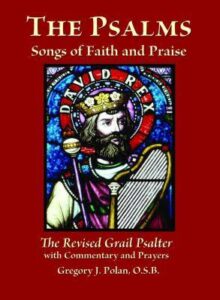 Gregory Polan, O.S.B., abbot primate of the worldwide Benedictine Confederation, was lead translator of The Abbey Psalms and Canticles, the English translation upon which our Turning to God’s Word two-part Bible study of the Psalms is based. Prepared by the monks at Conception Abbey and published by the United States Conference of Catholic Bishops (USCCB), The Abbey Psalms and Canticles is a 2020 revision of the monks’ 2010 translation of The Revised Grail Psalms. Abbot Polan is the author of The Psalms: Songs of Faith and Praise, a work that contains commentary and prayers as well as the Abbey’s complete translation of the Psalms. In addition, Abbot Polan wrote a gracious foreword to this Turning to God’s Word study, Sing a New Psalm: Communicating with God Through the Prayers of the Church—Volume I: Lauds & Vespers. That foreword appears at the front of the sample first lesson.
Gregory Polan, O.S.B., abbot primate of the worldwide Benedictine Confederation, was lead translator of The Abbey Psalms and Canticles, the English translation upon which our Turning to God’s Word two-part Bible study of the Psalms is based. Prepared by the monks at Conception Abbey and published by the United States Conference of Catholic Bishops (USCCB), The Abbey Psalms and Canticles is a 2020 revision of the monks’ 2010 translation of The Revised Grail Psalms. Abbot Polan is the author of The Psalms: Songs of Faith and Praise, a work that contains commentary and prayers as well as the Abbey’s complete translation of the Psalms. In addition, Abbot Polan wrote a gracious foreword to this Turning to God’s Word study, Sing a New Psalm: Communicating with God Through the Prayers of the Church—Volume I: Lauds & Vespers. That foreword appears at the front of the sample first lesson.
ex libris—two insightful papal commentaries on the Psalms

 Psalms & Canticles: Meditations and Catechesis on the Psalms and Canticles of Morning Prayer is a collection of reflections on the texts of the prayers at Lauds. These originally were delivered as part of Pope St. John Paul II’s Wednesday audiences. In another volume, Psalms & Canticles: Meditations and Catechesis on the Psalms and Canticles of Evening Prayer, Pope Benedict XVI continued the practice to include the biblical texts prayed at Vespers.
Psalms & Canticles: Meditations and Catechesis on the Psalms and Canticles of Morning Prayer is a collection of reflections on the texts of the prayers at Lauds. These originally were delivered as part of Pope St. John Paul II’s Wednesday audiences. In another volume, Psalms & Canticles: Meditations and Catechesis on the Psalms and Canticles of Evening Prayer, Pope Benedict XVI continued the practice to include the biblical texts prayed at Vespers.
 ex libris—we recommend other books as well
ex libris—we recommend other books as well
To learn about more books related to the Psalms, visit ex libris—main bookshelf. There you can read a brief review of the books that we like as well as short excerpts from them. If you want to judge the book by its cover, you can see a thumbnail of that. People especially interested in the theological virtues, which are emphasized throughout the Psalms, might like Faith Hope Love by Josef Pieper. The author’s academic discipline is philosophy rather than theology, and he uses language to narrow the definition of these three concepts and bring them into sharper focus for Catholics.
Q&A—about the confusing numbering systems
Many people notice some major differences in the way that the Psalms are numbered from one translation to another. This can frustrate anyone trying to communicate information about a particular Psalm. There are reasons why these discrepancies exist.
 Q: A participant in this study has asked why it is that we see two different numbers for most of the Psalms in The Abbey Psalms and Canticles.
Q: A participant in this study has asked why it is that we see two different numbers for most of the Psalms in The Abbey Psalms and Canticles.
A: When the Bible was written, it originally wasn’t divided into chapters and verses. That came later. The Psalms are an exception, however. Because they were composed as a collection of hymns to be used in the Jewish Temple, each hymn (Psalm) was numbered. Confusion comes about because two different numbering systems arose. Most modern Bible translations follow the numbering used in the Hebrew Masoretic text, including The Abbey Psalms and Canticles and its initial translation, The Revised Grail Psalms. The Abbey Psalms and Canticles uses the Hebrew Masoretic numbers in large red titles for the Psalms. In the page footers in the gutters of The Abbey Psalms and Canticles the Hebrew Masoretic numbers are listed first and Greek Septuagint numbers follow in parentheses. This Greek Septuagint numbering of the Psalms is used in the Latin Vulgate and the Douay-Rheims translations.
We refer only to the Hebrew Masoretic system in our two-part study, Sing a New Psalm: Communicating with God Through the Prayers of the Church. This is consistent with the way that the United States Conference of Catholic Bishops (USCCB) treats the Psalms. It’s expected that the Hebrew Masoretic numbering, which already is predominant in the Church, eventually will become the only system used in Catholic publications.
The New American Bible Revised Edition (NABRE) and the Revised Standard Version Catholic translations (RSVCE and RSV2C) follow the Hebrew Masoretic numbering system for the Psalms, but some other translations follow Greek Septuagint numbering system. First editions of the printed study book Sing a New Psalm: Communicating with God Through the Prayers of the Church—Volume I: Lauds & Vespers are based on The Revised Grail Psalms, a translation that was available online at the time and originally was linked on our website. The Revised Grail Psalms has been replaced by The Abbey Psalms and Canticles as the translation upon which the study book Sing a New Psalm: Communicating with God Through the Prayers of the Church—Volume I: Lauds & Vespers now is based. The Abbey Psalms and Canticles translation currently isn’t available online, so our website links to the RSVCE translation for all of the Psalms. The numbering of Psalms verses linked on our online study pages occasionally will differ from numbering in the study book.
This differences in numbering arose because two Hebrew Masoretic Psalms sometimes are combined as one in the Greek Septuagint system—and vice versa. The first numbering variance occurs when Hebrew Masoretic Psalm 9 and Psalm 10 are combined as Psalm 9. That causes the Greek Septuagint Psalms to be one number behind the Hebrew Psalms for most of the collection.
The next numbering shift occurs when Hebrew Psalm 114 and Psalm 115 are joined. This causes the numbering to be off by two, except that the next Psalm—Hebrew Psalm 116—is divided into the two Greek Psalms 114 and 115. So the Greek Psalms continue to be labeled one number behind the Hebrew Psalms—until Hebrew Psalm 147, which is divided into the two Greek Psalm 146 and Psalm 147. This puts Hebrew and Greek numbering of the final three Psalms—148, 149, and 150—in lock-step through to the end of the Psalms.
then there’s numbering of the verses …
Although most commonly used modern Catholic translations follow Hebrew Masoretic numbering to identify the Psalms, the verses can be numbered differently within an individual Psalm, depending on the translation. The Abbey Psalms and Canticles translation uses the same verse numbers as the New American Bible Revised Edition (NABRE), but the Revised Standard Version Catholic Editions (RSV2CE, which we reprint in our other Bible studies, and RSVCE, to which we link online unless otherwise indicated) follow a slightly different system. As long as you’re using The Abbey Psalms and Canticles or The Revised Grail Psalms for your lessons, you won’t run into discrepancies in any Turning to God’s Word study books. Because we link to the RSVCE on our website pages, it’s possible that you may encounter some instances where the verse numbers are off by one verse in some citations. We’ll try to identify these where they occur. These numbering differences happen because some translations include the brief explanatory note at the beginning of some of the Psalms as the Psalm‘s first verse (for example: “a Psalm of David …”).
is it Zion or Sion?
Sion, a variation of Zion, is the transliteration of a proper Hebrew place name. In The Revised Grail Psalms, the early version of The Abbey Psalms and Canticles, Zion is rendered as Sion. Early printings of Sing a New Psalm: Communicating with God Through the Prayers of the Church—Volume I: Lauds & Vespers reflect the spelling used in The Revised Grail Psalms. All future printings, including Volume II: Vigils, Day Prayer & Compline, scheduled to be published in 2025, will follow the publishing style of The Abbey Psalms and Canticles and will refer to the more common use of Zion instead of Sion, as will all online study pages that accompany Turning to God’s Word Catholic Bible studies.
Both spellings identify a hill that was the site of the ancient Jebusite fortress David captured before he established that location as his capital of Jerusalem. Zion came to refer to the royal city and later to the descendants of Jacob. Mount Zion is the elevation upon which Solomon built hisTemple, so in the Psalms—including in Psalm 2:6 and Psalm 76:2—Zion has come to symbolize the dwelling place of God. Daughter Zion appears in Scripture as a metaphor for all of the children of Israel. Zion and Mount Zion also are used (primarily by the Old Testament prophets but also in the book of Revelation) to represent the eschatological city of God yet to come.
videos to help understand Old Testament liturgy (1:29:03; 2:10:18; 1:11:42)
 People in one of our Psalms study groups expressed interest in learning more about ancient Hebrew worship practices. We recommend the following videos, which were recorded during conference talks by Turning to God’s Word author Matthew Phelps at our 2017 summer Bible study retreat at Conception Abbey. For talks from other previous retreats, check out our video page. Turning to God’s Word was forced to cancel these retreats in 2020 during COVID-19, and at this time there are no plans to resume them.
People in one of our Psalms study groups expressed interest in learning more about ancient Hebrew worship practices. We recommend the following videos, which were recorded during conference talks by Turning to God’s Word author Matthew Phelps at our 2017 summer Bible study retreat at Conception Abbey. For talks from other previous retreats, check out our video page. Turning to God’s Word was forced to cancel these retreats in 2020 during COVID-19, and at this time there are no plans to resume them.
a video with potential to change the way you approach the Bible (40:44)
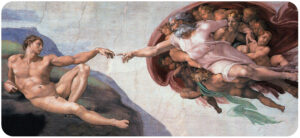 Even if you’re a veteran of Catholic Bible studies, we recommend that you watch an explanation of the practical benefits of approaching The Bible as the Living Word of God. This 40-minute video is distilled from a talk that Turning to God’s Word author Matthew Phelps gave at a summer Bible study retreat at Conception Abbey in Conception, Missouri. In this video, Turning to God’s Word author Matthew Phelps looks at how viewing Scripture as a living document can help us to develop a more intimate relationship with Jesus Christ. There are benefits in setting aside what we think we know about Scripture to approach the Bible with the goal of learning what new things God is saying to us. Matthew examines the principles of lectio divina, the traditional Catholic approach to reading and praying with Scripture that’s foundational for all Turning to God’s Word Bible studies.
Even if you’re a veteran of Catholic Bible studies, we recommend that you watch an explanation of the practical benefits of approaching The Bible as the Living Word of God. This 40-minute video is distilled from a talk that Turning to God’s Word author Matthew Phelps gave at a summer Bible study retreat at Conception Abbey in Conception, Missouri. In this video, Turning to God’s Word author Matthew Phelps looks at how viewing Scripture as a living document can help us to develop a more intimate relationship with Jesus Christ. There are benefits in setting aside what we think we know about Scripture to approach the Bible with the goal of learning what new things God is saying to us. Matthew examines the principles of lectio divina, the traditional Catholic approach to reading and praying with Scripture that’s foundational for all Turning to God’s Word Bible studies.
visual meditation is a form of prayer
If you like to draw, consider illustrating your prayers for Sing a New Psalm: Communicating with God 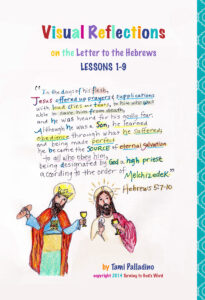 Through the Prayers of the Church—Volume I: Lauds & Vespers. Check out the
Through the Prayers of the Church—Volume I: Lauds & Vespers. Check out the drawings in this study and in the visual-meditation journal by Turning to God’s Word co-founder Tami Palladino to accompany The Letter to the Hebrews: An Explanation of the Mechanism of Our Salvation. Tami also illustrated The Revelation of Jesus Christ: The Faithful Witness, and some lessons in In the Beginning: The Book of Genesis and You Shall Have No Other Gods: The Book of Exodus.
drawings in this study and in the visual-meditation journal by Turning to God’s Word co-founder Tami Palladino to accompany The Letter to the Hebrews: An Explanation of the Mechanism of Our Salvation. Tami also illustrated The Revelation of Jesus Christ: The Faithful Witness, and some lessons in In the Beginning: The Book of Genesis and You Shall Have No Other Gods: The Book of Exodus.
Q&A—where to find some answers
Some people who are used to doing Bible studies from other publishers miss the answer keys included in those studies. One leader even admitted to us that she relied on answer keys so she didn’t have to spend time doing Bible study lessons herself. We sympathize with omnipresent time constraints, but we maintain that up-front answer keys provide people with a strong temptation to rely on someone else’s idea of what Scripture means instead of thinking more deeply about what God might be trying to say to them personally at that moment.
 Q: Why don’t Turning to God’s Word Catholic Bible studies provide any printed answer keys?
Q: Why don’t Turning to God’s Word Catholic Bible studies provide any printed answer keys?
A: The Turning to God’s Word method of Bible study is dependent on participants directly engaging with the biblical text and looking to that text for answers to their questions. All of the factual questions in the lessons can be answered from the Scriptures. Sidebars in the lessons contain supplemental material written to help explain some of the themes suggested by the biblical text. Most of our studies, including this one, feature videos with each lesson.
Outside commentaries can shed light on individual texts, but many commentaries examine Scripture passages out of context. Some may focus on an academic rather than a spiritual approach to the Bible. If you’re confused about anything in our studies or in any related outside commentaries, we encourage you to browse our website for more information.
The goal of all Turning to God’s Word Catholic Bible studies is to foster personal reflection leading to a more intimate relationship with Jesus. Consequently, each lesson contains  reflection questions, and these necessarily don’t have any “right” or “wrong” answers. If you’d like to share your thoughts about any of our studies or need clarification about a question, commentary, or video related to the lessons, contact us using the “ask us your question” or “what do you think” button on any online lesson page. Because others may have the same concern, we routinely turn questions and comments we receive into anonymous Q&A items and add them to the relevant online study pages.
reflection questions, and these necessarily don’t have any “right” or “wrong” answers. If you’d like to share your thoughts about any of our studies or need clarification about a question, commentary, or video related to the lessons, contact us using the “ask us your question” or “what do you think” button on any online lesson page. Because others may have the same concern, we routinely turn questions and comments we receive into anonymous Q&A items and add them to the relevant online study pages.
Q&A—three questions about Bible translations
We’re frequently asked what translation of the Bible is best. Sometimes we’re asked which translation is approved to be read at Catholic Masses. More infrequently we’re asked why we’ve chosen to reprint the Revised Standard Version Second Catholic Edition (RSV2CE) for the biblical text in our printed studies.
Q1: Which translation of the Bible is the best one for Catholics to read? 
A2: As far as which translation is “best,” we maintain that reading any translation of the Bible you have on hand is a great place to start. The old adage “every translator is a traitor” certainly applies to Scripture, but God’s basic message to his people can be found in any Bible. While there are English-language Bibles catering to a variety of special-interest Catholic groups, they generally reprint either a translation of the New American Bible Revised Edition (the NABRE) or a Catholic edition of the Revised Standard Version (the RSVCE or the RSV2CE), which are the Bibles read by most American Catholics. Both of these translations rely on archeological finds and scholarship that were unavailable in earlier centuries. Prior to the mid-1960s, many Catholics were familiar with the Douay-Rheims English translation, which was based on the Latin Vulgate. Originally translated by St. Jerome in the late 4th century, a version of the Vulgate has remained the official Latin translation of the Catholic Church since the 16th century. Prior to the mid-1960s, most Protestants read The King James Version.
As people become more interested in Scripture study, they also become more interested in reading the “right” Bible. Since very few of us are proficient in ancient languages, we’re forced to rely on the work of scholars who’ve spent years studying Hebrew, Greek, Aramaic, and Latin. In many cases, there simply isn’t an easy way to translate some of the original words and phrases of Scripture into English. The best advice we can offer is to choose an English translation that the Church has approved. The United States Conference of Catholic  Bishops (USCCB) offers guidelines. When questions arise, as they undoubtedly will, check out footnotes, commentaries, and other translations; talk to a knowledgeable priest; and—this part is most important—ask God to grant you increased understanding. You also can email us with your questions about Scripture. In many cases, Turning to God’s Word author Matthew Phelps’ background in classical languages proves helpful. We frequently rely on him to shed some light on the linguistics involved in difficult passages
Bishops (USCCB) offers guidelines. When questions arise, as they undoubtedly will, check out footnotes, commentaries, and other translations; talk to a knowledgeable priest; and—this part is most important—ask God to grant you increased understanding. You also can email us with your questions about Scripture. In many cases, Turning to God’s Word author Matthew Phelps’ background in classical languages proves helpful. We frequently rely on him to shed some light on the linguistics involved in difficult passages
Q2: I’m having trouble locating the same Bible that I hear read at Mass. What translation is that?
A2: The Catholic Lectionary, a collection of biblical texts approved for liturgical use, isn’t the same as a Bible. The English-language lectionary used in the United States is primarily based on a 1970 translation. A close English translation outside the lectionary is the New American Bible Revised Edition (NABRE). The United States Conference of Catholic Bishops (USCCB) currently is working on a liturgical Bible based on the NABRE translation.
 Q3: Why has Turning to God’s Word chosen to reprint biblical text from the Revised Standard Version Second Catholic Edition (RSV2CE) instead of the New American Bible Revised Edition (NABRE)?
Q3: Why has Turning to God’s Word chosen to reprint biblical text from the Revised Standard Version Second Catholic Edition (RSV2CE) instead of the New American Bible Revised Edition (NABRE)?
A3: We currently use the Revised Standard Version Second Catholic Edition (RSV2CE) as our primary biblical translation in our printed studies because scholars consider it to be a more faithful word-for-word translation than many other translations. Pope Benedict XVI quotes from the RSV2CE in his three-volume book, Jesus of Nazareth. The RSVCE is the Bible translation used in English translations of the Catechism of the Catholic Church. The RSV2CE varies only slightly from the earlier RSVCE, which we link to on our online study pages. Any discrepancies between the RSV2CE and the RSVCE are pointed out on the online study pages. Turning to God’s Word cites The Abbey Psalms and Canticles in references to the Psalms in all of our printed studies.
t he best Catholic commentary about Scripture
he best Catholic commentary about Scripture
To find out more about how Church teaching is supported by passages in Sing a New Psalm: Communicating with God Through the Prayers of the Church—Volume I: Lauds & Vespers, check out the Index of Citations in the Catechism of the Catholic Church. Links (Revised Standard Version Catholic Edition [RSVCE*]) to the primary Scripture passages in the lesson and relevant paragraphs in the Catechism are provided here. Not every passage in the biblical text for this study is referenced in a Catechism paragraph, however, including Psalm 141 and Psalm 142 in this lesson.
don’t forget about our indexes & extra online material

 If you’re trying to locate information about a specific Scripture passage, you can look it up in the index at the back of the study book or sample lesson. If you want to find a particular commentary, you can look up its title in the topics index. To learn more about another book of the Bible for which there’s a Turning to God’s Word study, visit the online study directories to read the commentaries and watch any accompanying videos. Finally, if you have a question or would like to make a comment about any of our studies, you can use one of the “ask us your question” or “what do you think” buttons to email our authors.
If you’re trying to locate information about a specific Scripture passage, you can look it up in the index at the back of the study book or sample lesson. If you want to find a particular commentary, you can look up its title in the topics index. To learn more about another book of the Bible for which there’s a Turning to God’s Word study, visit the online study directories to read the commentaries and watch any accompanying videos. Finally, if you have a question or would like to make a comment about any of our studies, you can use one of the “ask us your question” or “what do you think” buttons to email our authors.
ex libris—Church documents & books about religious topics
Link to magisterial documents referred to in our Bible studies at ex libris—magisterial documents.  This listing includes significant recent encyclicals as well as a number of historical Church documents. Recommended books related to Scripture study can be found at ex libris—main bookshelf.
This listing includes significant recent encyclicals as well as a number of historical Church documents. Recommended books related to Scripture study can be found at ex libris—main bookshelf.
memorize a favorite Bible verse (4:48)
Turning to God’s Word co-founder Tami Palladino has created a short video about the benefits of memorizing Bible verses. Choosing a passage that you find particularly meaningful will make the task easier. There are inspiring verses in every book of the Bible, but some people in our Turning to God’s Word Catholic Bible studies like to memorize a verse from their lesson every week. For more ideas, check out Tami’s video, Why Memorize Scripture? It’s less than five minutes long.
wondering how to pronounce some of these words?
The following links are to readings from the New International Version (NIV) Bible. To listen, open one of the links and click on the audio icon above the printed text. Although not taken from the translations used in our study materials, the NIV readings provide an audio guide to pronunciation of words in this lesson’s primary biblical texts. A close online version of the translation of the Bible used in Catholic liturgy in the United States as well as an audio guide for daily Mass readings for the current month can be found on the website of the United States Conference of Catholic Bishops (USCCB).
Psalm 141 (NIV)
Psalm 142 (NIV)
Psalm 119 (NIV)
 close with a Psalms-based prayer for Sunday 1st Vespers (Week I)
close with a Psalms-based prayer for Sunday 1st Vespers (Week I)
Many of our Catholic study groups like to conclude their discussions with a prayer based on the scriptural focus of their lesson, and some participants include Scripture-specific prayer in their individual study. If you’re uncomfortable composing your own Bible-based prayers, you can follow our four easy steps. If you prefer, you can pray using any of the Psalms in this lesson, or you can use the following short prayer.
O God, you are the refuge of all who call on you.
Respond in mercy to those who seek your protection.
Grant that we may show as much respect
in the words that we say about others and to them
as we do in the words that we use in prayer.
We ask this in the name of Jesus Christ,
the Word you sent to give your faithful people life. Amen.
Lesson 2 O God, at Dawn I Seek You, Sunday Lauds (Week I)—Psalm 63, Psalm 93, and Psalm 149
Lesson 28 The Just One Will Flourish, Saturday Lauds (Week II)—Psalm 92 and Psalm 135
you also may like our study of the book of Genesis
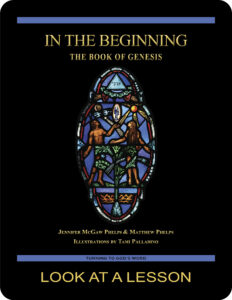 The first seven lessons of In the Beginning: The Book of Genesis, a 28-lesson Catholic Bible study with an imprimatur, provide an in-depth look at the very earliest biblical history—including the two accounts of Creation, events surrounding the Fall of Adam and Eve, the relationship between Cain and Abel, and the baptismal foreshadowing present in the account of Noah and the Flood. Remaining lessons look at lives of the patriarchs Abraham, Isaac, Jacob, and Joseph. Click on the book’s cover to view a sample lesson.
The first seven lessons of In the Beginning: The Book of Genesis, a 28-lesson Catholic Bible study with an imprimatur, provide an in-depth look at the very earliest biblical history—including the two accounts of Creation, events surrounding the Fall of Adam and Eve, the relationship between Cain and Abel, and the baptismal foreshadowing present in the account of Noah and the Flood. Remaining lessons look at lives of the patriarchs Abraham, Isaac, Jacob, and Joseph. Click on the book’s cover to view a sample lesson.
start a Turning to God’s Word Bible study
Thank you for your interest in Sing a New Psalm: Communicating with God Through the Prayers of the Church—Volume I: Lauds & Vespers. 
 More information about beginning a Turning to God’s Word Bible study can be found on this website at start a Bible study, and Tami, Matthew, and I are available to answer questions or discuss concerns. Contact us to start this or one of our other studies or to have your schedule listed with other TtGW study groups on our website. —Jennifer
More information about beginning a Turning to God’s Word Bible study can be found on this website at start a Bible study, and Tami, Matthew, and I are available to answer questions or discuss concerns. Contact us to start this or one of our other studies or to have your schedule listed with other TtGW study groups on our website. —Jennifer
*There are seven deuterocanonical books in the Old Testament—the Books of Tobit, Judith, Wisdom, Sirach, Baruch, and First and Second Maccabees, as well as some passages in the Books of Esther and Daniel. Protestants usually refer to these works as “apocryphal,” a word that means “outside the (Protestant) canon” because they’re excluded from most Protestant Bibles. The word “deuterocanonical” means “second canon”; Catholics use that word to refer to any section of the Catholic Old Testament for which there are no extant, or existing, Hebrew manuscripts. All of the deuterocanonical books appear in the Septuagint, the earliest remaining versions of which date to the 1st century B.C. This Greek translation of the Old Testament was in common use by Jews at the time of Jesus—but the same books aren’t found in existing Hebrew manuscripts, which aren’t as old as the oldest version of the Septuagint. Learn more by reading How Do Catholic & Protestant Bibles Differ?
Turning to God’s Word printed Bible studies use the 2006 Revised Standard Version Second Catholic Edition (RSV2CE) translation for all Scripture references except the Psalms, which are taken from The Abbey Psalms and Canticles, prepared by the monks of Conception Abbey and published in 2020 by the United States Conference of Catholic Bishops (USCCB). All Scripture links for the online study pages for Sing a New Psalm: Communicating with God Through the Prayers of the Church—Volume I: Lauds & Vespers are to the 1966 Revised Standard Version Catholic Edition (RSVCE) translation. The New International Version (NIV) audio recordings follow the same chapter and verse numbering as the RSV Catholic translations, but the NIV doesn’t include the deuterocanonical bpassages.
The 1966 RSVCE uses archaic pronouns and verb forms such as “thee,” “thou,” “didst” in the Psalms and in direct quotations attributed to God. The 2006 RSV2CE replaces those with more accessible English. The few significant translation changes in the RSV2CE include rendering almah as “virgin” in the Book of Isaiah 7:14 and restoring the term “begotten” in the Gospel According to John 3:16.
The Psalms in this Bible study reflect numbering used in The Abbey Psalms and Canticles; Psalms numbering may vary in other translations. Numbering also may vary for a few other passages in this Bible study. Turning to God’s Word studies follow the numbering in the Revised Standard Version Catholic translations (RSVCE and RSV2CE). Discrepancies in the New American Bible Revised Edition (NABRE) are noted in the Index of Scripture Citations in the study book and the online sample.
 The companion to this Catholic Bible study from Turning to God’s Word, Sing a New Psalm: Communicating with God Through the Prayers of the Church—Volume II: Vigils, Day Prayer & Compline, will cover Psalms not included in Volume I: Lauds & Vespers. Volume II: Vigils, Day Prayer & Compline is scheduled for publication in 2025.
The companion to this Catholic Bible study from Turning to God’s Word, Sing a New Psalm: Communicating with God Through the Prayers of the Church—Volume II: Vigils, Day Prayer & Compline, will cover Psalms not included in Volume I: Lauds & Vespers. Volume II: Vigils, Day Prayer & Compline is scheduled for publication in 2025.
